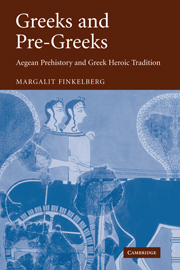Book contents
- Frontmatter
- Contents
- List of maps
- List of figures
- Preface
- List of abbreviations
- Chapter 1 Introduction
- Chapter 2 The heterogeneity of Greek genealogy
- Chapter 3 The pre-Hellenic substratum reconsidered
- Chapter 4 Kingship in Bronze Age Greece and Western Asia
- Chapter 5 Marriage and identity
- Chapter 6 The spread of the Greek language
- Chapter 7 The end of the Bronze Age
- Chapter 8 Continuities and discontinuities
- Appendix: The Testament of Hattusili
- List of references
- Index of passages cited
- General index
Chapter 2 - The heterogeneity of Greek genealogy
Published online by Cambridge University Press: 22 September 2009
- Frontmatter
- Contents
- List of maps
- List of figures
- Preface
- List of abbreviations
- Chapter 1 Introduction
- Chapter 2 The heterogeneity of Greek genealogy
- Chapter 3 The pre-Hellenic substratum reconsidered
- Chapter 4 Kingship in Bronze Age Greece and Western Asia
- Chapter 5 Marriage and identity
- Chapter 6 The spread of the Greek language
- Chapter 7 The end of the Bronze Age
- Chapter 8 Continuities and discontinuities
- Appendix: The Testament of Hattusili
- List of references
- Index of passages cited
- General index
Summary
GREEK GENEALOGICAL TRADITION
Like traditional poetries of other peoples, the traditional poetry of the Greeks celebrated the Heroic Age. This was the time when men were bigger and stronger, and they performed marvellous feats of prowess. Their weapons were made of bronze and not of iron, and they were ruled by kings. Mycenae, a small town in historic times, was the capital of a great kingdom. The gods not only kept company with mortals, but even consorted with mortal women and conceived children with them. This is why the heroes of Greek legend, mortal though they were, were considered divine offspring, ‘demigods’, and belonged to the Race of Heroes. The Heroic Age came to an end in two great wars - the Theban and the Trojan, which were especially designed by Zeus to put an end to the Race of Heroes. Introducing a terminology strikingly similar to that used in modern archaeology, Hesiod placed the Heroic Age between the Bronze Age and the Iron Age, the poet's own time. This was how the Mycenaean Greek civilisation of the second millennium bc was remembered in historic Greece.
Two distinct epic traditions specialised in perpetuating the memory of the Heroic Age. Side by side with the heroic epic proper, mostly associated with the name of Homer, there also flourished the tradition of the didactic epic, whose most prominent representative was Hesiod. The two traditions approached the Heroic Age from different perspectives.
- Type
- Chapter
- Information
- Greeks and Pre-GreeksAegean Prehistory and Greek Heroic Tradition, pp. 24 - 41Publisher: Cambridge University PressPrint publication year: 2006



